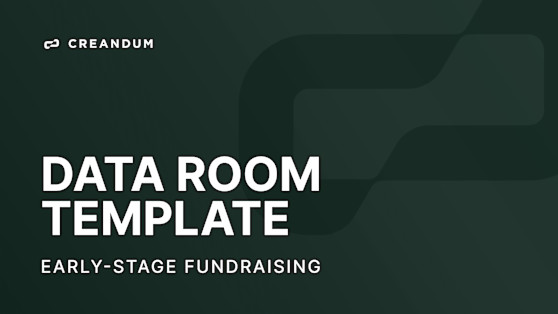
Welcome to the third edition of our annual report on early-stage founder compensation. It says so much about the space and time that we live and work in that all three of our reports have taken place against completely different economic backdrops. We carried out our inaugural report in 2022 as the tech sector was still reeling from the boom period that followed the pandemic—a time when growth was the name of the game.
The previous edition took place after the global recession broke when efficiency and cost-cutting were the priorities. While the global outlook remains uncertain, this year finds us, by and large, in a more stable position. The books have been balanced; companies are building again supported by reinvigorated investors. Meanwhile, AI—both the technology and the buzzword—is reshaping the space in all manner of unexpected ways. For founders, this adds extra complexity to the question this report aims to answer: How much should I pay myself? Many opted out of pay rises or took cuts last year, and bonuses all but stopped. Reintroducing salary raises and bonuses after that isn't straightforward.
We hope this report presents founders with a practical, helpful benchmark by which founders and their boards can make accurate data-driven decisions about what they should fairly pay themselves.
Please note: the data collection questions remain constant, yet the respondents are not all the same. Plus, this year, we have considerably more founders responding, we have added in extra sectors (Climate Tech and Health Tech) to collect a more granular view, and the distribution across funding stages was more evenly spread than in previous years.
Therefore, while these reports aim to provide a snapshot of how founder compensation has increased or decreased over 12 months, we see them first and foremost as an asset for entrepreneurs to turn to. To that aim, we hope you find it useful. Let’s dive in!
Key takeaways
Founder salaries have increased across all stages, most significantly for founders of bootstrapped and Pre-Seed companies.
Bonuses impact total compensation most at the bootstrapped and Series B funding stages.
Founders in France, Benelux and DACH are paid more than their UK counterparts.
Product-first founders are the highest-paid, replacing CFO and CROs.
While representation is still a huge issue, the gender pay gap has narrowed significantly.
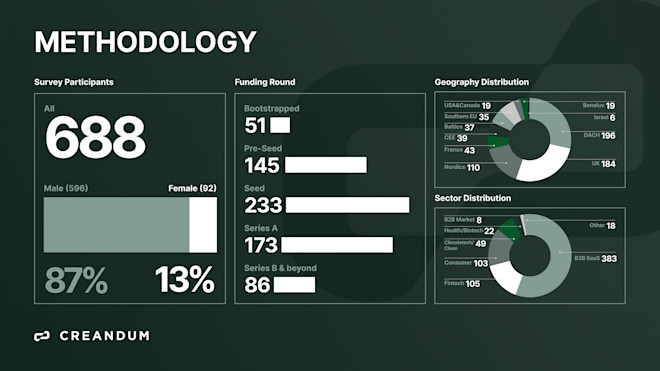
Salaries have increased across all stages
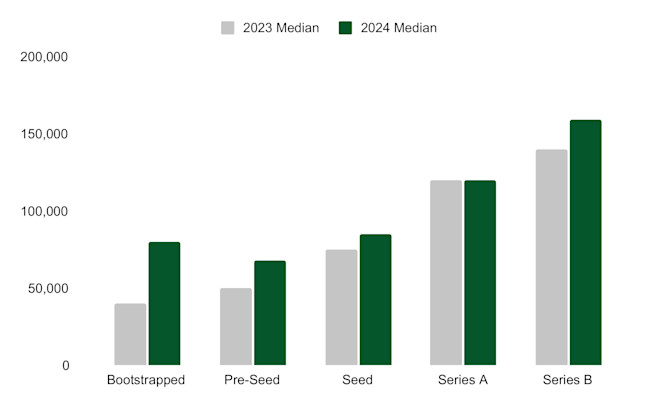
Median salary per stage (in €) in 2023 vs 2024
Salaries have increased at all stages except Series A, most significantly for bootstrapped and Pre-Seed founders, with the median [1] up by 100% and 37% respectively. Funding to European startups halved between 2022 and 2023, causing companies across the continent to restructure drastically. For many, a founder’s pay rise was simply out of the question. That now is changing. European funding is returning, companies' books are more balanced, and salaries are up for discussion. Salaries peak towards Series B at a median and average of around €159,000, up just 13% from last year. As we’ll get into later, however, we’re seeing more bonuses introduced to augment total compensation, perhaps to compensate for the stagnant salaries.
Since we began the survey three years ago, founder salaries have increased as their companies undergo more funding rounds (rising in line with funding amounts too), with the biggest jump coming between Seed and Series A, when startups typically receive that first significant injection of capital – the average European Series A round in 2024 was $10.6 million, whereas Seed rounds tend to top out at around $6 million.
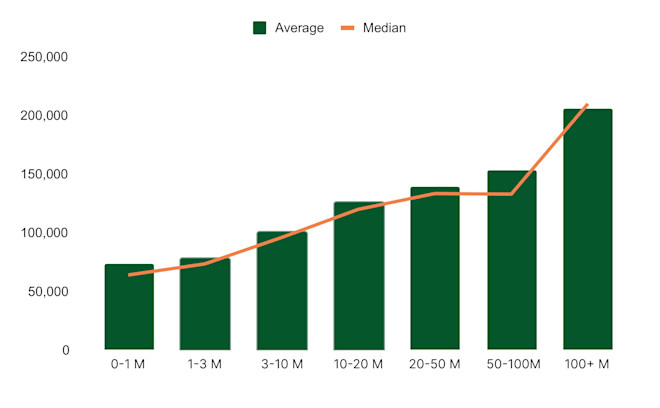
Average and Median Salary (in €) per Total Funding Amount
That delta has decreased since last year. In 2024, median salaries jumped by 41% between Seed and Series A – in 2023, the jump was 60%. We think there are several reasons why Pre-Seed and Seed funding rounds have been increasing in size recently, a trend which we noted in last year’s report as one of the reasons Pre-Seed founders were the only group to receive a median raise. Simultaneously, we see several new European Pre-Seed focused funds launched, which has continued into 2024 plus Seed deal sizes growing significantly. From Q4 2023 to Q1 2024, median Seed deal sizes grew by twice the size (17%) compared to Series A (9%). While median Series A deal sizes remain near pandemic-level numbers, Seed deal sizes have grown by over 65% since then. This may also partly explain why salaries for founders of Series A companies haven’t increased.
Bonuses are back (sort of)
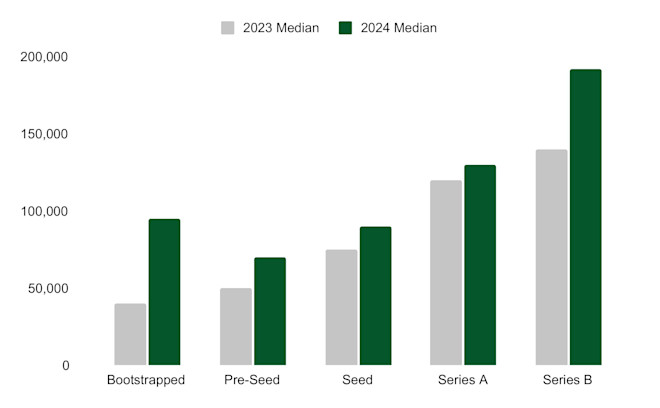
Median total compensation (salary + bonus in €) per stage in 2023 vs 2024
Total compensation has increased across the board, too, most significantly for founders of bootstrapped and Pre-seed startups, where the median was up by 138% and 40%, respectively. Despite this, bonuses are the lowest (5%) in Pre-Seed companies. For bootstrapped companies, however, bonuses make up 26% of salaries, meaning founders of those companies’ total compensation is, on average, higher than their Pre-Seed and Seed counterparts; this continues the 2023 trend, where bootstrapped founders were more likely to pay themselves a bonus than any other founder. We see that once there's been an external valuation and institutional capital injection into the business, the mechanism for bonuses changes or is erased as the steady flow of cash allows for founders to start paying themselves a regular base salary. The good news for bootstrapped founders is that this year, those bonuses are now supplemented with a salary increase.
As with base salaries, total compensation increases with the funding stage. The biggest increase comes between Series A and B (48%), pushing the median total compensation for a Series B founder to almost €200,000, with 24% of that figure coming from bonuses, likely reflecting the business performance required to reach a Series B funding round. Around B, the company has typically demonstrated a sustainable growth trajectory, proven it can scale without losing agility, and has secured larger contracts with new and existing customers. At this time, a performance-based variable is introduced to augment a typically lower founder-base salary compared to a 'hired-in' executive.
However, companies around the Series B stage were hit hardest last year, with many having to scale back growth and expansion made during the post-pandemic boom. Founders prioritized retention and cost-cutting, leading to just under 20% of Series B founders receiving a bonus. This has changed, and today, we see bonus allocation has more than doubled.
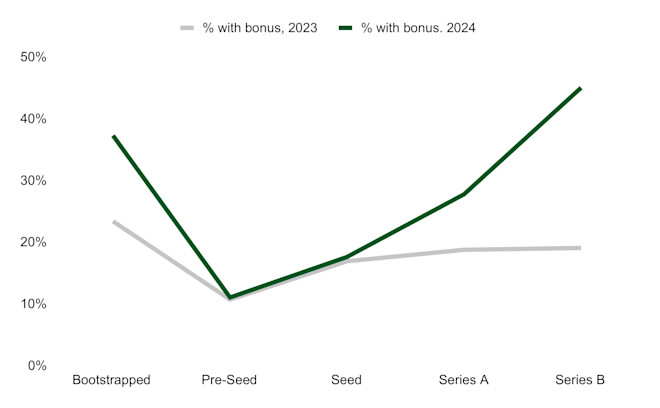
Percentage of founders who received a bonus per stage in 2023 vs 2024
Signs of progress toward equitable pay
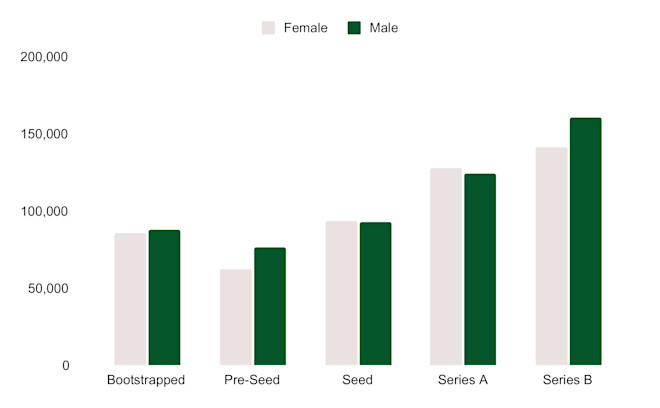
Average salary (in €) split by gender and stage
Over the past two years, this survey hammered home just how far the tech sector has to go on gender representation. Overall, we see six times more responses from male founders.
The most significant average pay gap was at the Pre-Seed stage, in which men get paid 23% more than women. Elsewhere, the gaps are narrower, with bootstrapped female founders earning 3% less and Series B founders earning 13% less. Female founders earn more than males at Series A and Seed companies. It's small but encouraging progress.
Number of co-founders is still the biggest factor when it comes to your final payday
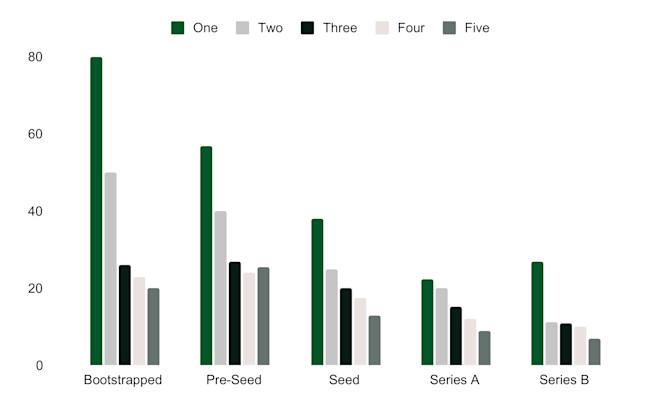
Percentage of Equity by stage by # of cofounders
Unsurprisingly, a founder’s equity share decreases as the startup matures, with the largest percentage decrease coming between Series A and B rounds, with equity decreasing by around 35%. Notably, there’s been a slight increase in equity for Series A founders, who last year had a median equity that was actually lower than founders of Series B companies.
The biggest driver of dilution remains the number of co-founders. Understandably, the more co-founders there are, the less equity there is to go around. Founders should remember that equity is your ultimate payday when your shares are liquidate. For example, the average equity percentage among bootstrapped founders was 44%. For companies with one founder, it’s just shy of 80%. By Series B, solo founders own just under 30% equity on average; at companies with five co-founders, it’s less than 7%.
UK founders are no longer highest-paid in Europe
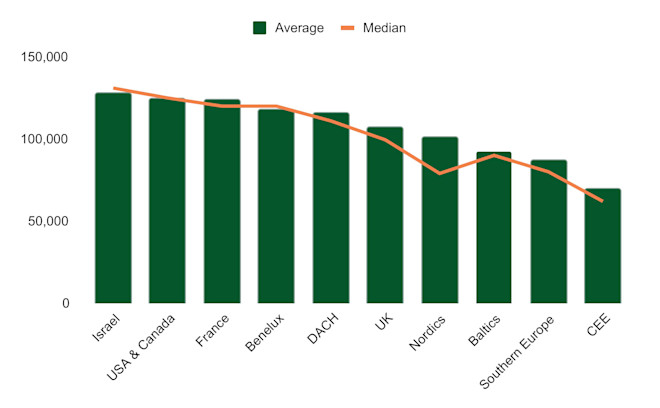
Average and median salary (in €) per region
For the last few years, the UK was the place to be for founders, and salaries were far and away the highest across Europe. This is shifting; with the UK now worse paid than founders in France and the Benelux and DACH regions. It’s not that UK founders have taken a pay cut – their average salaries are up 16% from last year – it’s that founders elsewhere have given themselves a much bigger raise. This is despite UK startups hoovering up a third of the continent’s VC funding – as much as French and German startups combined.
French salaries are up by 60% on average, while founder salaries across the Benelux region have increased by 90%. The area with the most considerable increase was the Baltics, where average wages increased by 174%. This drive in Estonia – home to the highest number of startups and tech unicorns in the world per capita – combined with influx of entrepreneurial talent crossing the border from Russia and starting businesses in the region. Following Russia’s invasion of Ukraine in 2022, there were reports of thousands of tech workers, or around 10% of the tech workforce, fleeing the country. Many crossed the border into Baltic nations such as Estonia and Lithuania, further improving their already impressive tech sectors. In fact, the average total compensation in the Baltics is now higher than anywhere in Europe.
Climate Tech founders mature into the highest earners
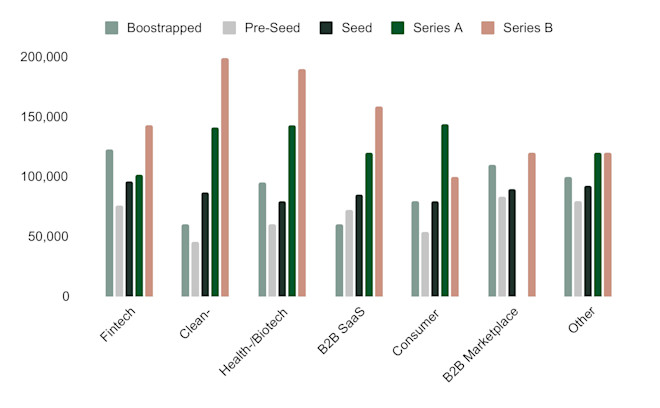
Median salary (in €) by industry and stage
After a tough 2023, it has been a strong year for European Fintech, with funding increasing by 45% year-over-year in Q3 2024, reaching $1.6 billion. As a result, Fintech founders—the highest median earners in 2022 and 2023—remain the highest earners at bootstrapped, Pre-Seed, and Seed stages. Founders in Climate Tech, Health Tech, and B2B SaaS startups have overtaken Fintech compensation.
These salaries reflect a particularly positive year for climate and health tech. Climate Tech startups received more investment than any other tech sector in the first half of 2024, bringing in €7.7 billion in equity and €13.2 billion in debt. However, as of Q3 2024, Health Tech startups had secured more VC funding than any other sector during the year to date. In Q3 2024 alone, Health Tech companies raised $2 billion, according to Dealroom.
Salaries jump much later in the funding journey, reflecting the upfront costs typically required for Health and Climate Tech projects and the longer timelines to profitability due to extended development cycles. Conversely, Fintech founders tend to hit higher salaries earlier because of the quicker path to monetization and lower capital needs.
Product-focused founders overtake CROs and CCOs as the highest earners
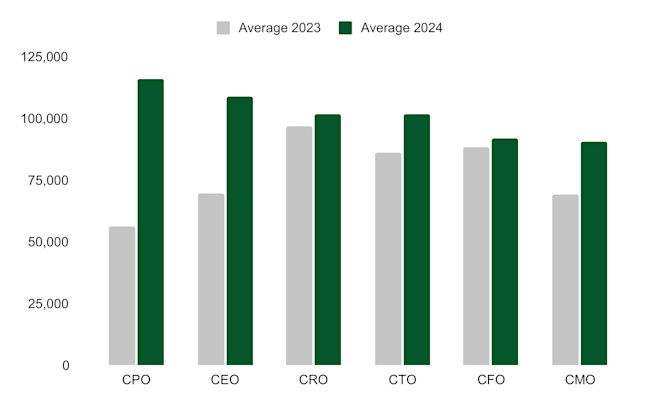
Average salary (in €) by main function 2023 and 2024
Last year, amidst economic turmoil and an industry shift away from a rapid growth mentality, founders who doubled up as Chief Commercial Officers or Chief Revenue Officers were found to be the highest paid. This year, with the books balanced and products once again being built en-masse, its Chief Product Officers are taking the most home, with an average salary of just over €116,000. AI is likely a factor, too, with CPOs more likely to be engineers, many of whom have famously been pulling in some wild salaries over the last 12 months.
CEO founders are now the second highest earners – or highest median earners. From what we've seen among our portfolio companies, CEO founders took the biggest hit last year, sacrificing their earnings to retain as many team members as possible. We're now seeing a correction as the market stabilizes.
Regardless of role, salaries grow considerably as the number of full-time employees under a founder’s management grows, reflecting the size of the job at hand and the growth of the company. The biggest jump comes after a company hits around 200 FTEs.
We assume that many of the 200+ companies will be Series B or beyond, where founders will have been in the job long enough for their shares to have vested, while the company should have scaled their product-market-fit and de-risked the business. At that point, founders can then assume a more traditional CEO role (or, as we’ve seen, another C-suite position) and begin to command a salary that a CEO of a 200-person company would expect.
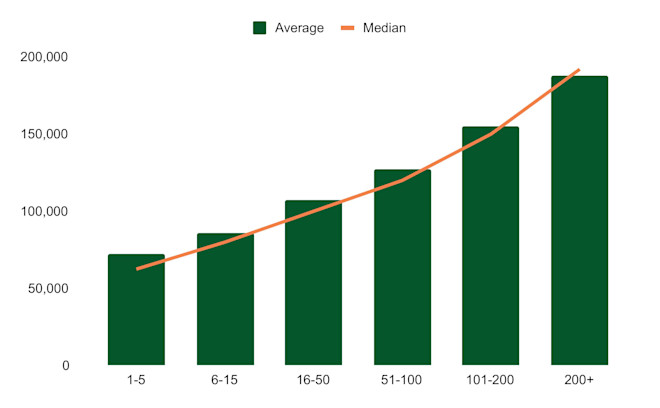
Average and median salary by number of FTE
The Compensation Calculator
On top of sharing our research findings, we have added the new data to our Compensation Calculator, our practical tool to help you better navigate compensation from Pre-Seed to Series B+.
Try it out, add your data, and help us all create the industry standard benchmark for early-stage compensation. There is no easy solution, no one-size-fits-all answer to founder compensation, but this takes us a little closer from art to science — a focus point around which more informed conversations and a community can coalesce.
Summing up: Founders rewarded for tough times
Few early-stage founders haven't had to make tough decisions in recent years. Raises and bonuses were predominantly non-starters, especially at companies downsizing or amidst a funding round. It is a testament to a founder's leadership, whatever their role in the company, to navigate through recent turbulent times. Many startups that launched in the early 2020s did not make it through, while launching a new venture and attracting funding has been, until very recently, challenging.
This year's report shows that founders reward themselves fairly for those efforts. Or at least raise their salaries as their businesses grow. It also shows an industry in flux; the UK is no longer home to the highest earners, overtaken by founders in France and Benelux. Likewise, Fintech founders no longer earn the most across the fundraising journey, with their counterparts in Health Tech and Climate Tech earning more from Series B onwards. CPOs have also become the highest-earning founders, replacing CROs and CCOs, a sign that startups are returning to building. Elsewhere, it's encouraging to see a reduction in the gender pay gap and disheartening that there seems to be little movement regarding representation.
Founders, none of this is to say that you should look at these results and immediately adjust your pay packet to reflect them. As always, these findings are a benchmark rather than a rulebook. A starting point for conversations with your investors and team.
With every year and every response, this project has become a better resource for startup founders, investors, and board members. It remains a true privilege to share this data with you as a "work in progress." We appreciate any feedback. If you didn't contribute this year, please do so next time. Until then, just like last year, watch this space.
---
[1] Footnote: in compensation reporting, it's essential to look at both average and median salaries because they each provide different insights into the distribution:
Median: represents the middle point with 50% above or below. It's less affected by extreme values, making it a more neutral measure of central tendency.
Average: can be influenced by outliers, particularly high salaries at the upper end of the distribution, which can skew the overall picture.
Comparing the two reveals a more nuanced understanding of the shape of distribution and helps compensate for the limitations of each to enable you to make a more balanced set of decisions.


